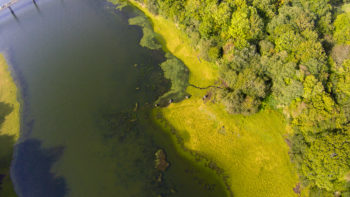PEDAL Prediction and Early Detection of Algal blooms in lakes and reservoirs
Competition: Breakthrough 5: Catalyst
Amount awarded: £1,949,171
Led by: South West Water
Project completion date: Ongoing
Water cycle tag: Water abstraction and storage
Partners: University of Exeter, Plymouth Marine Laboratory, South West Lakes Trust, Uisce Éireann (formerly Irish Water), Dŵr Cymru Welsh Water, Anglian Water, Severn Trent Water, Northumbrian Water, Wessex Water, Affinity Water, Westcountry Rivers Trust, Cardiff University, CSIR, Environment Agency, University of Waikato, NexusBit Integral, Western Cape Department of Water and Sanitation, NASA BioScape, Korea Environment Institute, Northern Ireland Water, Northern Ireland Department of Agriculture, Environment and Rural Affairs
Algal blooms damage water quality and wildlife and are costly to treat. By predicting them in advance we protect nature, reduce water treatment costs and keep water safe and affordable for everyone.
“To innovate, you need two things, investment, and brilliant minds. Today’s announcement, part of a £2.17m project, reflects both, as we invest in pioneering forecasting tools to transform how the sector will manage algae blooms, supporting a healthier, more sustainable ecosystem.”
Susan Davy, Chief Executive Officer, South West Water
“We are delighted that this vital project, led by colleagues at the Centre for Resilience in Environment, Water and Waste (CREWW), has been selected to receive such significant funding. It is a testament to not only the globally recognised expertise of our team and partners in this crucial area of environmental research, but also the ability of CREWW to deliver real world impact, and solutions, that make a difference to people’s everyday lives.
“This project has the potential to develop pioneering new methods to predict and detect the onset of algal blooms in our water systems, to help experts take action before they affect both water quality and supply. It will help companies to continue to ensure safe, affordable water and protect our natural spaces and ecological health.”
Professor Lisa Roberts, President and Vice-Chancellor of the University of Exeter
Image credit – South West Water
Image caption: Climate change risks increasing algal bloom formations, such as these seen on the margins of this drinking water reservoir


